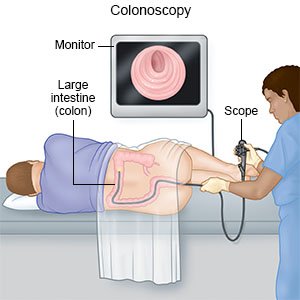Colonoscopy
Medically reviewed by Drugs.com. Last updated on Aug 4, 2025.
AMBULATORY CARE:
What you need to know about a colonoscopy:
A colonoscopy is a procedure to examine the inside of your colon (intestine) with a scope. A scope is a flexible tube with a small light and camera on the end. Polyps or tissue growths may be removed during your colonoscopy.
How to prepare for your colonoscopy:
Give your healthcare provider a list of all the medicines, supplements, and herbs you take. Your provider will tell you if you need to stop any medicine for the colonoscopy, and when to stop. Your provider will tell you which medicines to take or not take on the day of your colonoscopy. Arrange for someone to drive you home after your procedure.
How bowel prep is done:
Your healthcare provider will have you prepare your bowels before your procedure. It is important for your bowels to be empty before your procedure to allow your provider to see your colon clearly. You will need to do the following:
- Have only clear liquids for the entire day before your colonoscopy. Clear liquids include plain gelatin, unsweetened fruit juices, clear soup, and broth. Do not drink any liquid that is blue, red, or purple.
- Follow your bowel prep as directed. Many different preparations can be used before a colonoscopy. With any bowel prep, stay close to the bathroom. This prep will cause your bowels to move often.
- Use an enema if directed. Your provider may tell you to use an enema to help clean out your bowels.
What will happen during your colonoscopy:
- You will be given medicine to help you relax. You will lie on your left side and raise one or both knees toward your chest. Your healthcare provider will examine your anus and use a gloved finger to check your rectum. You may need another enema if your bowel is not empty. The scope will be lubricated and gently placed into your anus. It will then be passed through your rectum and into your colon. Water or air will be put into your colon to help clean or expand it. This is done so your healthcare provider can see your colon clearly.
- Tissue samples may be taken from the walls of your bowel. If you have a polyp, your healthcare provider will remove it. Tissue samples and polyps are sent to a lab for tests.
 |
What will happen after your colonoscopy:
You may feel bloated or have some gas and abdominal discomfort. You may be asked to pass gas before you go home. You may need to lie on your left side with a heating pad on your abdomen. Eat small meals until your bloating has improved.
Risks of a colonoscopy:
You may have pain or bleeding after the scope or polyps are removed. You may also have a slow heartbeat, decreased blood pressure, or increased sweating. Rarely, your colon may tear due to the increased pressure from the scope and other instruments. This may cause bowel contents to leak out of your colon and into your abdomen. If this happens, you may need to have surgery on your colon.
Related medications
Seek care immediately if:
- You have a large amount of bright red blood in your bowel movements.
- Your abdomen is hard and firm and you have severe pain.
- You have sudden trouble breathing.
Call your doctor if:
- You develop a rash or hives.
- You have a fever within 24 hours of your procedure.
- You have not had a bowel movement for 3 days after your procedure.
- You have questions or concerns about your condition or care.
After your colonoscopy:
- Do not lift, strain, or run until your healthcare provider says it is okay.
- Rest as much as possible. You have been given medicine to relax you. Do not drive or make important decisions for at least 24 hours. Return to your normal activity as directed.
- Relieve gas and discomfort from bloating by lying on your left side with a heating pad on your abdomen. You may need to take short walks to help the gas move out. Eat small meals until bloating is relieved.
If you had polyps removed:
Do not take aspirin for 7 days after your procedure, or as directed.
Help prevent constipation:
- Eat a variety of healthy foods. Healthy foods include fruit, vegetables, whole-grain breads, low-fat dairy products, beans, lean meat, and fish. Ask if you need to be on a special diet. Your healthcare provider may recommend that you eat high-fiber foods such as cooked beans. Fiber helps you have regular bowel movements.

- Drink liquids as directed. Adults should drink between 9 and 13 eight-ounce cups of liquid every day. Ask what amount is best for you. For most people, good liquids to drink are water, juice, and milk.
- Exercise as directed. Talk to your healthcare provider about the best exercise plan for you. Exercise can help prevent constipation, decrease your blood pressure and improve your health.
Follow up with your doctor as directed:
Write down your questions so you remember to ask them during your visits.
© Copyright Merative 2025 Information is for End User's use only and may not be sold, redistributed or otherwise used for commercial purposes.
The above information is an educational aid only. It is not intended as medical advice for individual conditions or treatments. Talk to your doctor, nurse or pharmacist before following any medical regimen to see if it is safe and effective for you.
Learn more about Colonoscopy
Treatment options
Symptoms and treatments
Further information
Always consult your healthcare provider to ensure the information displayed on this page applies to your personal circumstances.
